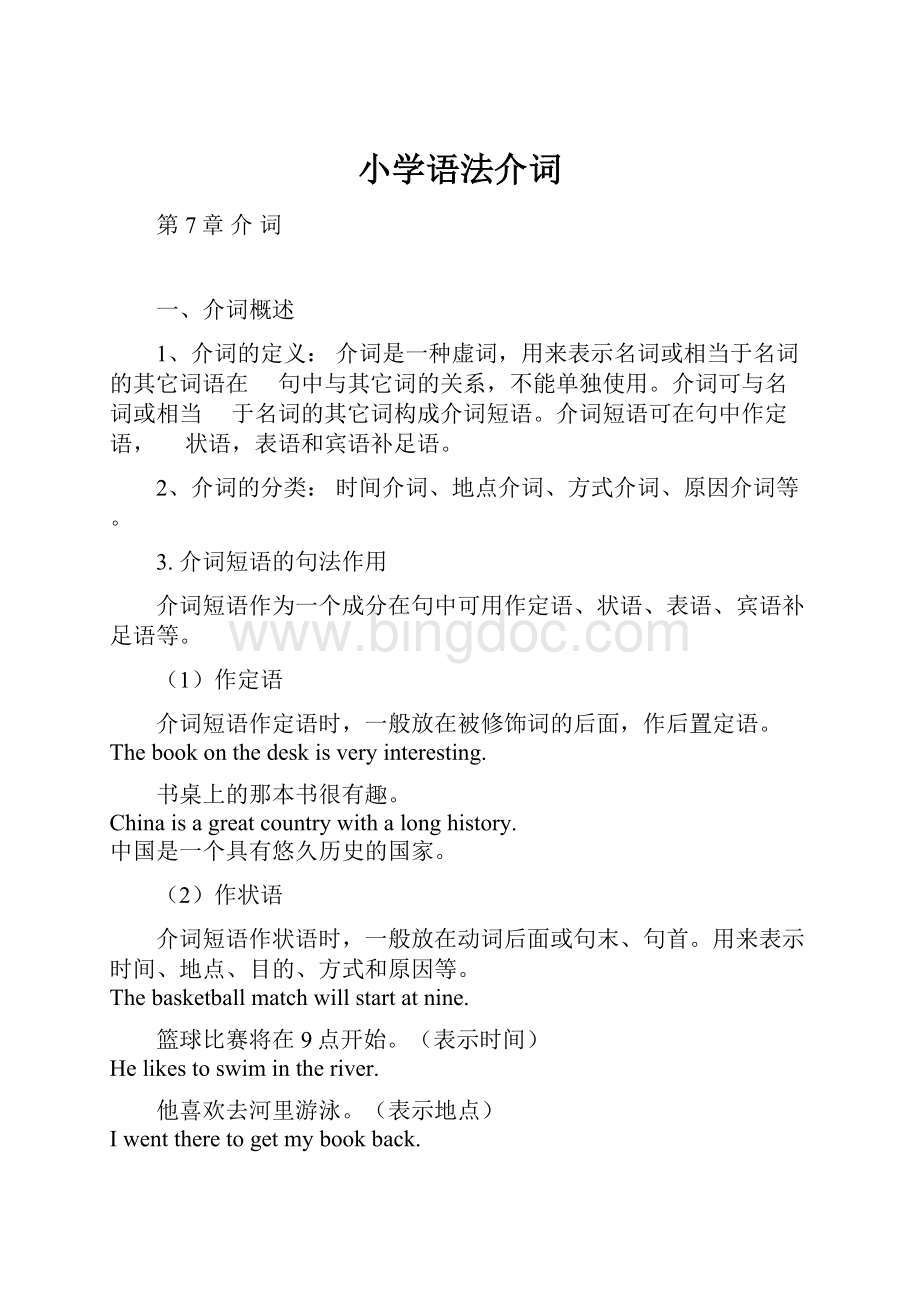小学语法介词.docx
《小学语法介词.docx》由会员分享,可在线阅读,更多相关《小学语法介词.docx(19页珍藏版)》请在冰点文库上搜索。

小学语法介词
第7章介词
一、介词概述
1、介词的定义:
介词是一种虚词,用来表示名词或相当于名词的其它词语在句中与其它词的关系,不能单独使用。
介词可与名词或相当于名词的其它词构成介词短语。
介词短语可在句中作定语,状语,表语和宾语补足语。
2、介词的分类:
时间介词、地点介词、方式介词、原因介词等。
3.介词短语的句法作用
介词短语作为一个成分在句中可用作定语、状语、表语、宾语补足语等。
(1)作定语
介词短语作定语时,一般放在被修饰词的后面,作后置定语。
Thebookonthedeskisveryinteresting.
书桌上的那本书很有趣。
Chinaisagreatcountrywithalonghistory.
中国是一个具有悠久历史的国家。
(2)作状语
介词短语作状语时,一般放在动词后面或句末、句首。
用来表示时间、地点、目的、方式和原因等。
Thebasketballmatchwillstartatnine.
篮球比赛将在9点开始。
(表示时间)
Helikestoswimintheriver.
他喜欢去河里游泳。
(表示地点)
Iwenttheretogetmybookback.
我去那里取回我的书。
(表示目的)
Icameherebybike.
我骑自行车来到这里。
(表示方式)
Shewastremblingwithfear.
她吓得直发抖。
(表示原因)
(3)作表语
介词短语作表语时,一般放在be动词和连系动词之后。
I’mondutytoday.
今天我值日。
MyEnglishteacherisfromAustralia.
我的英语老师来自澳大利亚。
(4)作宾语补足语
介词短语作宾语补足语时,一般放在宾语之后。
Ifoundeverythingingoodcondition.
我发现一切状况良好。
Whenhewokeup,hefoundhimselfinthehospital.
当他醒来时,他发现自己在医院里。
二、介词考点纵览
知识点考点
考点对应典型例题剖析
考点一:
表示时间的介词
考点1:
in的用法。
与morning,afternoon, evening连用表示在上午、下午、晚上。
They always play basketball in the afternoon. 他们经常在下午打篮球。
Don’t eat too much in the evening. 晚上不要吃太多。
表示在某世纪、年代、年、月、季节的含义时。
She came to this factory in 1970. 她是在1970年来到这个工厂工作的。
It often snows heavily here in winter.这儿冬天经常下大雪。
表示从现在起一段时间以后。
(这个用法常用将来时)
Tom will be back from America in a week.汤姆一周之后将从美国回来。
I will go to visit you in a month.一个月后我将会去拜访你。
典型例题1
The train is starting___five minutes.
A. in B. at C. for D.of
答案:
A
典型例题2
Mrs.Brown came to China ____ 1996.
A.on B. of C. toD. in
答案:
D
典型例题3
Ilikemakingsnowmen___winter.
A. in B. at C. for D.on
答案:
A
考点2:
at的用法。
表示某一具体时刻(几点几分时)。
She gets up at seven o'clock in the morning.
她早晨七点钟起床。
Bella got home at eight yesterday evening.
Bella昨晚八点钟到家。
用在特定的时候(时节、时机)。
We were happy at that time.
我们那个时候很幸福。
I think the school has been closed at this time.
我想学校这个时间已经关门了。
与noon、night、weekends连用。
You can see many stars in the sky at night.
在夜里你会看到天空有许多星星。
What do you always do at noon?
你中午经常做些什么?
表示“在……岁”时。
At the age of two, the girl could run.
在2岁的时候,这个小女孩就会跑了。
典型例题1
The English teacher told me to get there____ half past ten.
Ain B. at C. on D. of
答案:
B
典型例题2
He often goes ____ school ____ six thirty.
A. for; to B. to; atC. to; for D, for; at
答案:
B
典型例题3
Ioftenhavelunch____ noon.
A. for B. toC. in D.at
答案:
D
考点3:
on的用法。
表示“在具体的某一天”或“(在具体的某一天的)早上、中午、晚上”等,须用介词on。
JackwasbornonMay10th,1982.
杰克生于1982年5月10日。
Theyleftonarainymorning.
他们是在一个雨天的早上离开的。
表示“在星期几”或“在星期几的早上、中午、晚上”等,须用介词on。
Wedon’tgotoschoolonSaturdayandSunday.我们星期六和星期天不上学。
Whattimedoyougetuponweekdays?
你在平日什么时候起床?
IheardthisstoryonSaturdaymorning.我是在星期六的早晨听到这个故事的。
表示“在某一节日”时,须用介词on。
WeusuallyeatmooncakesonMid-autumnFestival.我们通常在中秋节吃月饼。
Mr.HureceivedacardonTeachers’Day.胡老师在教师节那天收到了一张卡片。
注意:
当morning,evening,afternoon被of短语修饰时,习惯上用on,而不用in。
ontheearlymorningofSeptember10th在9月10的清晨
典型例题1
HewentbacktoAmericaasummerafternoon.
Ain B. at C. on D. of
答案:
C
典型例题2
He often goestothelibrary ____ Saturdaymorning.
A. onB.atC. to D, for
答案:
A
典型例题3
Imethim____ thelateafternoonofSeptember12th
A. for B. toC. on D.at
答案:
C
考点4:
before、after和from的用法。
before表示“在……之前”。
Washyourhandsbeforedinner.在晚餐之前你要洗手。
Ihavetofinishmyhomeworkbefore10o’clock.我不得不在十点之前完成家作。
after表示“在……之后”。
Theyoftenplayfootballafterclass.他们经常在下课后踢足球
MyfatheroftenwatchesTVafterdinner.我爸爸经常晚饭后看电视。
from表示时间时,常和to连用,构成from…to…的结构,表示“从…到…”。
Hekeptonworkingfromseventotwelvelastnight.他昨晚从7点一直工作到12点。
IgotoschoolfromMondaytoFriday.我周一到周五要去学校。
典型例题1
经理七点后回来。
翻译:
Themanagerwillcomebackafterseveno’clock.
典型例题2
三天后,我去参加了一个聚会。
翻译:
AfterthreedaysIwenttoaparty.
典型例题3
她从早唱到晚。
翻译:
Sheissingingfrommorningtonight.
考点二:
表示地点、方位的介词
考点1:
in的用法。
表示在较大的地方。
inthefactory在工厂inShanghai在上海inChina在中国
表示“在……里面”。
Therearemanyapplesinthebox.盒子里有许多苹果。
Heputhishandsinhispockets.他把他的手放进口袋。
典型例题1
They arrived at the famous town___South Jiangsu.
A.inB.onC.atD.of
答案:
A
典型例题2
She is living___Nanjing.
A.onB.inC.atD.of
答案:
B
典型例题3
Canyouseethebook___the box?
A.atB.inC.onD.of
答案:
B
考点2:
at的用法。
表示在较狭窄较小的地方。
Shallwemeetatthestation?
我们在车站见面好吗?
用于门牌号码前。
Helivesat115ZhongshanRoad.他住在中山路115号
典型例题1
They arrived at the famous town___South Jiangsu.
A.inB.onC.atD.of
答案:
A
典型例题2
Doyounoticethebread___thetable?
A.onB.inC.atD.of
答案:
C
典型例题3
Mybrotherstayed___homelastnight.
A.atB.inC.onD.Of
答案:
A
考点3:
on,over和above的用法。
on表示“在……之上”(两物体接触)。
Therearesomeapplesonthetree.树上有一些苹果。
Thereisabookonthedesk.桌上有一本书。
over表示“在……正上方”(两物体的表面没有接触)。
Theskyisoverourheads.天在我们的头顶上。
above表示“在……之上”(不一定垂直,两物体的表面没有接触)。
Theplaneisflyingaboveclouds.飞机在云上飞行。
典型例题1
Sheputhercoat___thebed.
A.inB.overC.aboveD.on
答案:
D
典型例题2
Thereisabridge___thesea
A.inB.overC.aboveD.on
答案:
B
典型例题3
Thebirdisflying___thewater.
A.inB.overC.aboveD.on
答案:
C
考点4:
under和below的用法。
under表示“在……正下方”(其反义词是over)。
Thereisaballunderthedesk.在桌子下有一个球。
below表示“在……下方”(不一定是正下方)。
Fromthetopofthehill,wecouldseetheblueoceanbelow.我们从山顶上能看到下边蓝色的大海。
典型例题1
在线下写上你的名字。
Writeyournamebelowtheline.
典型例题2
猫在桌子下面。
Thecatwasunderthetable.
典型例题3
她把信放在枕头下。
Sheputtheletterunderthepillow.
考点5:
behind、infrontof、inthefrontof的用法。
behind表示“在……后面”。
Thereisanewcarbehindthehouse.
在房子后面有一辆新车。
infrontof表示“在……(一个整体的)前面”。
inthefrontof表示“在……(一个整体前半部分的)前面”。
典型例句:
Thedriverisusuallyinthefrontofthecar.司机通常坐在汽车前面。
Anoldmanisstandinginfrontofthecar.车前面站着一位老人。
Therearemanybooksbehindthebox.箱子后面有很多书。
考点6:
between、among的用法。
between表示“在……(两者)之间”。
Mybedroomisbetweenmytwosisters’.我的卧室在2个姐姐房间之间
among表示“在……(三者或三者以上)之间”。
Thereisablackbagamongallthesebags.在这些书包之中有个黑书包。
典型例题1
Thereisabank_____twobuildings.
A.amongB.betweenC.inD.of
答案:
B
典型例题2
Iamsitting_____myparents
A.amongB.betweenC.inD.of
答案:
B
典型例题3
Iseeabeautifulflower_____thetrees.
A.amongB.betweenC.inD.of
答案:
A
考点三:
表示动向的介词
考点1:
into、outof的用法。
into表示从外到里;outof表示从里到外。
Isawthemgointothehouse.我看见他们都走进了房子里。
Lilyrunsoutoftheclassroom.Lily跑出了教室。
典型例题1
一只兔子从箱子里跳了出来。
翻译:
Arabbitjumpsoutofthebox.
典型例题2
老师带着一本书走进了教室。
翻译:
Theteacherwalkedintotheclassroomwithabook.
典型例题3
Iwent_____thecinematowatchafilm
A.intoB.outofC.inD.on
答案:
A
考点2:
up、down的用法。
up表示向上;down表示向下。
Weclimbedupthemountaintothetop.我们爬上了山顶。
Sheopenedthedoorandwentdownthestairs.她打开门然后走下楼梯。
考点3:
across、through的用法。
across表示“从……(表面)穿过”
Hewalkedacrosstheroadcarefully.他小心地穿过马路。
Theduckisswimmingacrosstheriver.鸭子正游过那条河。
through表示“从……(里面)穿过”
Shewalkedthroughtheforestalone.她独自穿过森林。
Hewantstogooutthroughthewindow.他想从窗户出去。
典型例题1
Lookleftandrightbeforeyougo_____thestreet.
A.acrossB.throughC.inD.on
答案:
A
典型例题2
Thesungoes_____thewindow.
A.acrossB.throughC.inD.on
答案:
B
典型例题3
Thetrainisgoing_____thetunnel.
A.acrossB.throughC.inD.on
答案:
B
考点四:
表示方式的介词
考点1:
表示方式的介词主要由by、with、in等。
by表示“靠、用、以……手段”。
Ialwaysgotoschoolbybus.我总是坐公交车去上学。
Hemakesalivingbysellingnewspapers.他靠卖报纸营生。
with表示“使用(有形工具)、和……一起、具有…、带有…”。
Hecutthecakewithaknife.他用到切蛋糕。
Igotoschoolwithmyfriends.我跟朋友一起去上学。
Themanwithbigeyesismyfather.这个大眼睛的男人是我爸。
in表示“用……语言,以……方式”。
HecanspeakEnglish.他会说英语。
典型例题1
Hebrokethewindow_____astone.
A.byB.withC.inD.from
答案:
B
典型例题2
What’sthis_____English?
A.inB.overC.aboveD.on
答案:
A
典型例题3
Mybrothergetstoschool_____buseveryday.
A.inB.overC.byD.on
答案:
C
三、综合练习
1.单项选择
( )1.It’stime______supper.
A.atB.in C.on D.for
( )2.It’snotime______school.It’stime______gobackhome.
A.to,for B.to,to C.for,toD.for,for
( )3.Mr.Browncomes______America.
A.at B.from C.in D.to
( )4.What’sthis_____English?
A.in B.at C.on D.under
( )5.SometimesIgotoschool_____foot.
A.by B.in C.on D.With
( )6.Count_____one_____ten.
A.from,by B.from,to C.to,to D.at,to
( )7.Mysisterislooking____hernewshoesnow.
A.at B.after C.for D.to
( )8.It’scoldoutside.Please_____yourwarmclothes.
A.putin B.takeoff C.puton D.putup
( )9.Theclassroomisquitedifferent_____thatone.
A.of B.from C.with D.like
( )10.---Domanychildreninourclassoftenskate________winter?
---Yes,theyusuallyhavefun_______winter.
A.in,in B.on,on C.at,atD.for,in
( )11.---Doestheautumnstart_________August?
---Sometimesitdoes.Butusuallyitstarts_______September.
A.in,in B.on,on C.at,atD.for,in
( )12.Iusuallyplaytabletennis________school.
A.after B.w